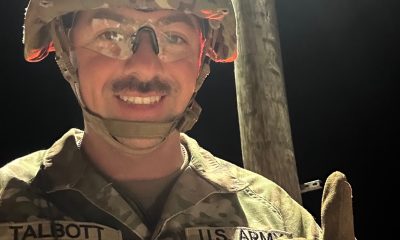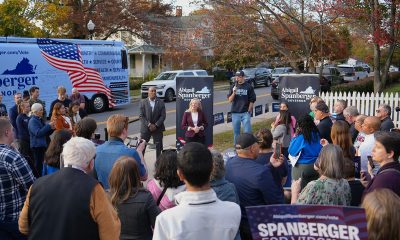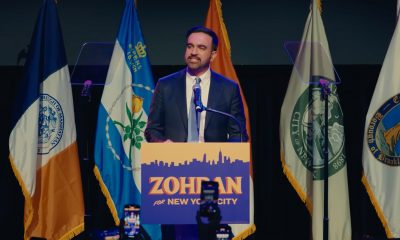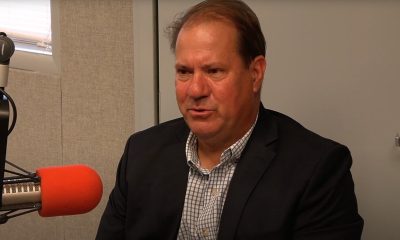News
Final rule announced for LGBT workplace executive order
No comment period prior to final rule on directive
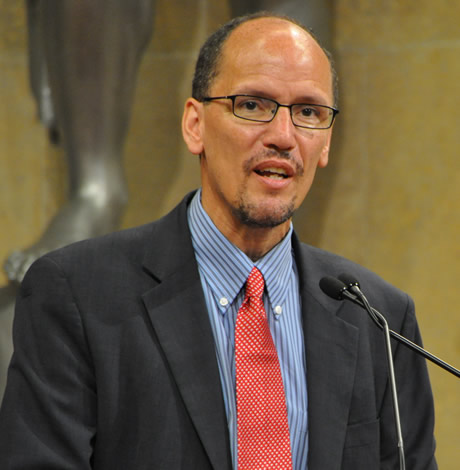
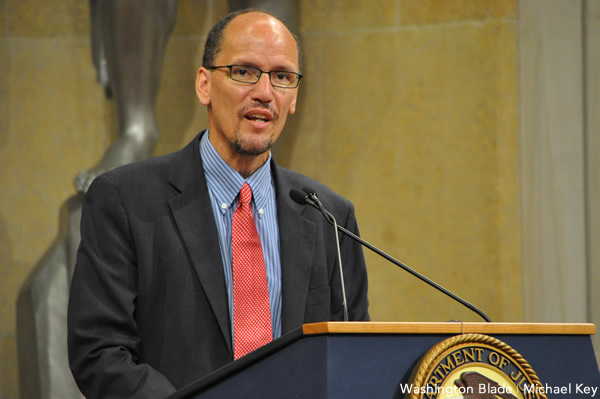
Labor Secretary Thomas Perez announced the rule is final for an executive order barring LGBT workplace discrimination. (Washington Blade file photo by Michael Key)
A new rule for an executive order signed by President Obama prohibiting federal contractors from engaging in anti-LGBT workplace discrimination is now final, the Labor Department announced Wednesday.
Following years of pressure from LGBT advocates, Obama signed the order on July 21, but the process wasn’t yet final because the Labor Department and the Office of Management & Budget had to draft a rule to implement the measure.
Once the final rule is published in the Federal Register, it will become effective 120 days later and apply to federal contracts entered into or modified on or after that date, according to the Labor Department.
After its announcement, the Labor Department published Frequently Asked Questions for the final rule, which can be found here. The final rule itself is set to be online at 4:30 pm, according to the Labor Department. UPDATE: The final rule is here.
Labor Secretary Thomas Perez said in a statement the final rule for the executive order, known as Executive Order 13672, is a step in the path to ending anti-LGBT discrimination in the workforce.
“Americans believe in fairness and opportunity,” Perez said. “No one should live in fear of being fired or passed over or discriminated against at work simply because of who they are or who they love. Laws prohibiting workplace discrimination on the bases of sexual orientation and gender identity are long overdue, and we’re taking a big step forward today to fix that.”
No explicit protections exist in federal code prohibiting companies from discriminating on the basis of sexual orientation and gender identity, although the U.S. Equal Employment Opportunity Commission has interpreted existing protections for gender to protect transgender workers.
The executive order is considered the first federal action to ensure LGBT employment non-discrimination in the public sector. However, in April the Obama administration interpreted the LGBT non-discrimination provisions in reauthorization of the Violence Against Women Act to extend to employment at organizations accepting federal grants for domestic violence programs.
Charged with enforcing the executive order is the Labor Department’s Office of Federal Contract Compliance Programs, which is headed by Patricia Shiu.
“We are building on the work of presidents and members of Congress from both parties who have expanded opportunities for America’s workers,” Shiu said in a statement. “This rule will extend protections to millions of workers who are employed by or seek jobs with federal contractors and subcontractors, ensuring that sexual orientation and gender identity are never used as justification for workplace discrimination by those that profit from taxpayer dollars.”
In October, the Labor Department had submitted its proposed rule for the executive order to the Office of Management & Budget. No comment period took place for the proposed rule.
Laura McGinnis, a spokesperson for the Labor Department, said the administration didn’t allow for a comment period because of the nature of the executive order.
“In cases where an Executive Order is very clear about the steps the department needs to take and leaves no discretion regarding how to proceed, agencies may publish final rules without notice and comment,” McGinnis said. “So this one was sent to OMB as a final rule.”
District of Columbia
High cost of living shuts essential workers out, threatens D.C.’s economic stability
City residents don’t always reflect those who keep it running

When Nic Kelly finishes her 6 a.m. shift as a manager at PetSmart, she walks to her bartending job at Alamo Drafthouse in Crystal City to serve cocktails, beers, and milkshakes for hundreds of guests.
Kelly, 26, doesn’t work a combined 60-65 hours per week to pocket extra cash –– she does it to barely make her almost $1,700 rent each month.
“I’m constantly working, and some days I work two jobs in the same day,” Kelly said. “But twice now I’ve had to borrow money from my mother just to make sure I pay my full rent.”
Yesim Sayin, D.C. Policy Center executive director, said this is unfortunately how the D.C. area is structured –– to keep essential workers, service employees, and lower-income people out and those with greater economic mobility in.
The DMV area’s high cost of living makes it near-impossible for employees who keep the area running to make a living, Sayin said. In 2022, only 36% of D.C.’s essential workers lived in the city, according to a D.C. Policy Center report. D.C. is also ranked 13th in the world for highest cost of living as of Nov. 7.
But for Sayin, there’s more work for policymakers to get done than simply acknowledging the high cost of living. Take a look at how current policies are impacting residents, and what long-term solutions could help the DMV thrive.
Feeling the high cost of living
D.C. has the highest unemployment rate in the country at 6.0% as of August. Sayin said the city’s high unemployment rate reflects a lack of geographic mobility in its population, meaning those who can’t find jobs can’t afford to look outside of the DMV area.
Though there are job training groups working to close the unemployment gap, securing a job –– let alone two –– rarely guarantees a comfortable lifestyle for essential and service employees.
A single-person household in D.C. with no children must make at least $25.98 an hour to support themselves, according to the Living Wage Calculator. That number jumps to $51.68 an hour for a single adult with one child. Minimum wage in D.C. is $17.95 an hour and $10 an hour for tipped employees.
Whether it’s utilizing free meals at the Alamo to save on groceries or borrowing money to make rent, every week could bring a different sacrifice for Kelly.
While Kelly lives and works a few minutes south of D.C., Sayin said the connectedness of the DMV means you don’t have to travel far to feel the withering effects of the area’s high cost of living.
“People don’t really care what flag adorns their skies,” Sayin said. “They’re looking for good housing, good schools, cheaper cost of living, and ease of transportation.”
For those that stay in the DMV area, those conditions are hard to come by. This can lead to people working multiple jobs or turning to gigs, such as Uber driving or selling on Etsy, to fill income gaps. Sayin said there are short-term benefits to securing these gigs alongside a primary job, such as helping people weather economic storms, avoid going on government assistance or racking up debt.
But she said the long-term implications of relying on gigs or other jobs can harm someone’s professional aspirations.
“You can spend three extra hours on your own profession every work week, or you can spend three hours driving Uber. One gives you cash, but the other gives you perhaps a different path in your professional life,” Sayin said. “And then 20 years from now, you could be making much more with those additional investments in yourself professionally.”
There’s a strong demand for work in D.C., but when the city starts suffering economically, those who live outside the area –– usually essential or remote workers –– will likely find work elsewhere. Sayin said this negatively impacts those employees’ quality of life, giving them less professional tenure and stability.
D.C.’s cost of living also centralizes power in the city, according to Sayin. When lower-wage employees are priced out, the residents who make up the city don’t always reflect the ones who keep it running.
“Ask your Amazon, Uber or FedEx driver where they live. They’re somewhere in Waldorf. They’re not here,” Sayin said.
Working toward an accessible D.C.
Build more. That’s what Sayin said when thinking of ways to solve D.C.’s affordability crisis.
But it’s not just about building more –– it’s about building smartly and utilizing the space of the city more strategically, Sayin said.
While D.C. has constructed lots of new housing over the years, Sayin noted that they were mostly built in a handful of neighborhoods tailored to middle and upper-class people such as The Wharf. Similarly, building trendy small units to house young professionals moving to the city take up prime real estate from struggling families that have much less geographic mobility, she said.
“The affordability problem is that today’s stock is yesterday’s construction,” Sayin said.
Solving these issues includes ushering in a modern perspective on outdated policies. Sayin cited a D.C. policy that places restrictions on childcare centers built on second floors. Since D.C. parents pay the highest rates in the country for childcare at $47,174 annually, she said loosening unnecessary restrictions could help fuel supply and lower costs for families.
Sayin said policymakers need to consider the economic challenges facing residents today, and whether the incentives and tradeoffs of living in D.C. are valuable enough to keep them in the city.
For Kelly, the incentives and tradeoffs of staying in the DMV area aren’t enough. She’s considered moving back in with her mom a few times given how much she has to work just to get by.
Aside from wanting higher compensation for the work she does –– she noted that businesses can’t operate without employees like her –– Kelly also questioned the value of the tradeoff of moving so close to the city.
“There’s no reason why I’m paying $1,700 for a little studio,” Kelly said. “You also have to pay for parking, utilities aren’t included and a lot of residents have to pay for amenities. We are just giving these property management companies so much money, and we’re not really seeing a whole lot of benefit from it.”
Sayin said placing value on the working people of the city will inject fresh life into D.C.’s economy. Without a valuable tradeoff for living in or around the city, there’s little keeping essential and service employees from staying and doing work taken for granted by policymakers.
District of Columbia
Activist hosts Diwali celebration in D.C.
More than 120 people attended Joshua Patel’s party on Nov. 9.

LGBTQ activist and businessman Joshua Patel hosted a community Diwali party on Nov. 9.
Patel organized the event as a community gathering amid the Trump-Vance administration’s policies against LGBTQ inclusion and DEI. The event, held at the Capo Deli speakeasy, drew more than 120 attendees, including local business leaders.
Patel is a franchise owner of ProMD Health, recently awarded as the best med spa by the Washington Blade. He is also a major gift officer at Lambda Legal.
Patel noted that upon moving from New York to Washington in 2022, he desired a chance for community-based Diwali celebrations. He stated that the city offered minimal chances for gatherings beyond religious institutions, unless one was invited to the White House’s Diwali party.
“With our current administration, that gathering too has ended — where we cannot expect more than Kash Patel and President Trump lighting a ‘diya’ candle on Instagram while simultaneously cutting DEIB funding,” Patel said.
In addition to celebrating the festival of lights and good over evil, Patel saw the event as a moment to showcase “rich, vibrant culture” and “express gratitude.”
Patel coined the celebration a “unifier.”
“From a spiritual angle, Shiva was the world’s first transgender God, taking the form of both “male” and “female” incarnations,” Patel said. “The symbolism of our faith and concepts are universal and allows for all to rejoice in the festivities as much or little as they desire.”
Savor Soiree, DMV Mini Snacks and Capo Deli catered the event. DJ Kush spun music and Elisaz Events decorated the Diwali celebration.
The Diwali party also featured performances by former Miss Maryland Heather Young Schleicher, actor Hariqbal Basi, Patel himself and Salatin Tavakoly and Haseeb Ahsan.
Maryland
Harford school board appeals state’s book ban decision to circuit court
5-2 ruling in response to ‘Flamer’ directive

By KRISTEN GRIFFITH | Marking a historic moment in Maryland’s debate over school library censorship, Harford County’s school board voted Thursday to appeal the state’s unprecedented decision overturning its ban of a young adult graphic novel, pushing the dispute into circuit court.
The 5-2 vote followed a recent ruling from the state board overturning Harford’s ban of the book “Flamer.” In a special meeting Thursday afternoon, board members weighed whether to seek reconsideration or take the matter to circuit court — ultimately opting to appeal.
The book “Flamer” is by Mike Curato, who wrote about his experience being bullied as a kid for being gay.
The rest of this article can be found on the Baltimore Banner’s website.
-

 Politics4 days ago
Politics4 days agoPro-trans candidates triumph despite millions in transphobic ads
-

 Opinions4 days ago
Opinions4 days agoDemocratic Socialism won’t win the whole country
-

 National4 days ago
National4 days agoUS bishops ban gender-affirming care at Catholic hospitals
-

 Maryland5 days ago
Maryland5 days agoSalisbury, Md. rainbow crosswalk removed on Veterans Day

